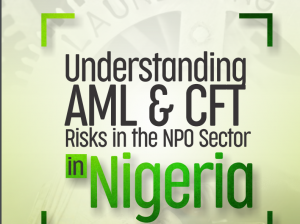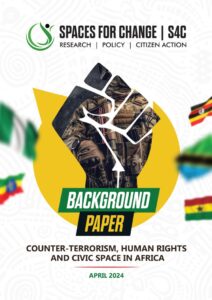SPACES FOR CHANGE led a delegation of civil society organizations (CSOs) under the banner of the Action Group on Free Civic Space to meet with external assessors during the second round of Nigeria’s Mutual Evaluation (ME) and onsite visit by the Financial Action Task Force (FATF) and Intergovernmental Action Group Against Money Laundering (GIABA). The meeting with assessors was held on October 9, 2019 in Abuja, Nigeria’s Federal Capital Territory. The CSO delegation, comprising representatives of 7 Nigerian organizations, were selected out of a larger pool of over 60 non-profit organizations (NPOs) working on a diverse thematic issues (ranging from gender to youth, security, governance, accountability, security and so forth), but committed to ensuring that government regulation in the name of national security do not shrink the civic space in the country.
Nigeria was scheduled for the second round of Mutual Evaluation (ME) and onsite visit by the Financial Action Task Force (FATF) and Intergovernmental Action Group Against Money Laundering (GIABA). During the evaluation exercise scheduled for September to October 2019, a team of FATF/GIABA assessors evaluated the effectiveness of the measures put in place to combat money laundering and the financing of terrorism in the financial and non-financial sectors of the Nigerian economy. The non-profit sector is among the sub-sectors of the Nigerian economy subjected to the scrutiny of the external assessors led by GIABA’s Gina Wood and Michael Lieberman from the United States Department of Treasury.
To prepare and harmonize strategies for engaging the external assessors, CSOs met thrice on September 13, 2019 in Abuja (42 organizations), October 3, 2019 in Lagos (23 organizations) and held another closed-door meeting on October 8, 2019 (7 organizations) in Abuja to co-create a unified sector position and voice to defend the non-profit sector from security-related measures that shrink the civic space, violating the rights of civil society actors and human rights defenders. Consequently, civil society actors built consensus around the issues detailed in the report below, which forms the sectoral position on AML/CFT regulation of the NPO sector.
The highlights of the discussion are detailed below:
- The AML/CFT Regimes Apply to the NPO Sector in Nigeria
AML/CFT regulatory oversight for the NPO sector is fragmented across multiple government departments such as the Corporate Affairs Commission (CAC), Special Control Unit against Money Laundering (SCUML), Ministry of Planning, Financial Reporting Council of Nigeria (FRCN), Federal and State Inland Revenue Service, Nigerian Financial Intelligence Unit and so forth.
The majority of non-profits in Nigeria are registered under Part C of the Nigeria’s Companies and Allied Matters Act (CAMA) as Incorporated Trustees. Enacted in 1990, amendments to several provisions of CAMA in 2018 saw the introduction of new measures to bolster corporate performance and enhance AML/CFT compliance culture within corporate entities, including NPOs. One such new provision relates to beneficial ownership disclosures which obligates the identification of the person(s) who directly or indirectly own, control or enjoy the benefits of corporate entities.
- AML/CFT Regulations Have Impacts on Non-profit Activities
NPOs are subject to the regulation of a host of agencies such as CAC, SCUML, NFIU, FRCN, FIRS, NPC, banks etc. These entities primarily undertake regulatory oversight through various methods and restrictions such as the requirement for periodic financial reports, submission of currency transaction reports (CTRs) and Suspicious Transaction Reports (STRs), filing of annual returns in lieu of tax exemptions, surveillance of financial inflows, winding up erring NPOs, among several others.
Significant overlaps and the duplicity of regulatory functions often results in multiple reporting obligations to different entities. For instance, NPOs file annual returns to the CAC where they submit financial statements detailing inflows and spending within a fiscal year, among other information. More detailed particulars of the same set of transactions are filed with SCUML on a weekly or monthly basis depending on whether they are CTRs, STRs etc as the case may be. For many entities, especially the smaller non-profits, compliance with the plethora of reporting obligations to multiple entities can be burdensome as considerable time and resources are expended on satisfying legal requirements than on their actual humanitarian work.
- The Reason(s) Behind Low Reporting of Suspicious Transactions by NPOs
Nigeria’s National Risk Assessment (NRA) scores NPOs low on reporting suspicious transactions (STRs). External assessors wanted to know why. NPOs do not have a strong record of submitting STRs because most organizations receive funding through established channels and known funding sources in the form of donor grants and charitable donations from well-known philanthropic institutions. Grant-making, for the most part, involves rigorous due diligence, selection and contract award processes. A number of philanthropic institutions are famed for their painstakingly rigorous and forensic methods of project selection, payments, appraisals and reporting systems. In some cases, copies of the grant contract are shared with the commercial banks where the grant funds are deposited. For these reasons, NPOs rarely submit STRs to SCUML due to the absence of suspicion regarding the funding source.
- NPOs Have Internal Control Measures to Prevent Money Laundering (ML) and Terrorist Financing (TF)
NPOs usually have a board of trustees that oversees the affairs of the organization and develop policies that guide their staff conduct, including the day-to-day office administration. To open a bank account, the BVN of the trustees must be disclosed to the bank. The organization must also obtain a Tax Identification Number, and register with SCUML. Disclosure of the BVN numbers of the NPO trustees is also a pre-condition for registration with SCUML.
NPOs also conduct external audits annually. Apart from that, they submit interim and annual financial reports to their donors based on the terms of the grant. Particulars of these transactions are disclosed in organizational annual reports, which is one of the documents attached to the annual returns filed at the CAC at the end of the fiscal year.
- NPOS Have Concerns about the Results of Nigeria’s National Risk Assessment (NRA) on Money Laundering and Terrorist Financing Risks in Nigeria
With specific reference to SPACES FOR CHANGE’s March 2019 report which extensively analyzed the implications of the Nigeria NRA on non-profit operations in Nigeria within the context of FATF’s Recommendation 8, the external assessors also wanted to understand the concerns NPOs have about Nigeria’s NRA. First off, AML/CFT ratings for the non-profit sector need more evidence. Unsubstantiated media reports in circulation linking NPOs operating in North-East Nigeria to terrorist activity are not conclusive evidence of terrorist abuse of NPOs. Accusation of terrorist activity is a grave claim, requiring robust evidence, actual arrests, identification of offending individuals and organizations, criminal prosecution, forced operational closures, convictions etc.
FATF Standards require that a risk-based approach (RBA) should be applied to NPOs operating in that region in order to address the higher TF vulnerabilities that they face. Applying a risk-based approach is particularly imperative because NPOs operating in the North-East do not constitute up to 0.1% of the over 60,000 non-profits registered in Nigeria. Therefore, the blanket generalization of NPOs as being vulnerable to abuse by terrorists is speculative and unsupported by evidence, especially for the subset of NPOs working across the country on diverse issues ranging from governance to accountability, rule of law, women and children’s rights, youth, education, agriculture, healthcare, energy, faith-based advocacy, community rights, environmental justice, housing and urban governance, and so forth.
Another major concern NPOs have about the NRA is the description of NPOs as Designated Non-Financial Institutions/Designated Non-Financial Businesses and Professions (DFNIs/DNFBPs). NPOs are calling for an urgent review of this classification because it extends the applicability of the stringent AML/CFT reporting obligations to the non-profit sector. The onerous and multiple reporting obligations imposed on NPOs ostensibly flow from this classification.
- NPOs Strongly Object to the Introduction of Another Dedicated Regulator (NGO Bill)
Attempts at passing restrictive legislative proposals—such as the 2014 and 2016 NGO Bills—designed to regulate NPOs and interfere with their funding, have been resisted, and remain unpopular for many reasons. First, the proposed statutes aimed at creating a dedicated regulatory body, called the NGO Regulatory Commission, that will duplicate the extant regulatory functions of the CAC and SCUML.
- Confining NPO Regulation to SCUML and CAC is Good Practice
SCUML has taken the lead in conducting outreach and sensitizing NPOs on their AML/CFT obligations. SCUML certificates are only issued to NPO trustees. The certificate collection is preceded by sensitization about the attached AML/CFT reporting obligations. Introducing a new regulator will roll back the advocacy gains made over the years to build trust, enhance AML/CFT compliance culture and heighten collaboration between NPOs and SCUML and CAC.
- Politically Exposed Persons (PEPS) and the Non-profit Sector in Nigeria
The Central Bank of Nigeria’s (CBN’s) 2013 AML/CFT Regulations classifies anybody associated with people entrusted with prominent public functions in Nigeria as Politically Exposed Persons (PEPS). The practice of PEPs, especially wives of state governors setting up non-profits to carry out certain types of good works during the tenure of their husbands, should be distinguished from other types of non-profit operations. Wives of governors and political office holders have enormous access to the corridors of power, political figures, and of course financial resources sourced from local philanthropists, individual donors and institutions seeking political patronage from their husbands. The high potential for money laundering cannot be ignored.
It’s worth restating that Nigeria is replete with statutes governing many types of criminal behaviour, including illicit financial flows involving all types of persons, entities and of course, PEPs. Certain infractions within the non-profit space need to be investigated and resolved distinctly as they occur, allowing the applicable regulations to take full course. For instance CBN’s 2013 AML/CFT Regulations requires financial institutions to obtain management approval before conducting any business relationship with PEPs, and shall render monthly returns on such accounts to the CBN and NFIU. Should any irregularity in non-profit transactions linked to PEPs occur, then, the CBN regulation should apply and the case resolved within that context of that violation. The practice of using singular incidents as a basis for introducing additional regulations for the entire sector should be discouraged.
- Post-meeting Continuous Engagement with GIABA
The Action Group on Free Civic Spaces continues to engage with GIABA assessors.





















